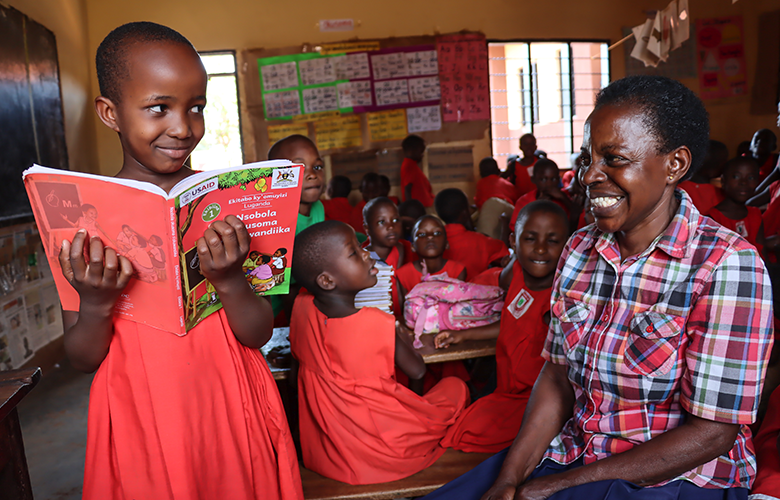
“If we see a child going away from school, it is very painful.”
-Primary school teacher, Luwero District
Staff from EDC’s USAID Uganda Integrated Child and Youth Development (ICYD) Activity recently traveled to Luwero District to speak with teachers and community members in four primary schools about how they are collaborating to keep children, especially girls, in school.
Ugandan primary schools were closed for two years during the COVID-19 pandemic—the longest closure in the world. Even after schools reopened in February 2022, many students struggled to attend daily. In Luwero, children supported their family farms during the pandemic or engaged in income-generating activities that were difficult to give up when schools reopened. Parents migrated to find job opportunities and left children with family members, who struggled to meet the costs of school attendance.
Girls face unique barriers to attendance, especially during crises, and they are vulnerable to exploitation, neglect, and abuse. Some teachers in Luwero shared stories of girls disappearing from school suddenly, to be discovered pregnant at home. Menstruation supplies are scarce generally, but especially so during crises, also causing girls to stay home. And traveling to school can be unsafe; Ugandan girls report being taunted, groped, and intimidated.
Schools can also be unsafe spaces. Although illegal, corporal punishment remains a recourse for overwhelmed teachers managing very large classes with few resources. Luwero teachers also recounted students acting out violently, isolating, and bullying. Transactional sex between teachers and students also occurs.
What are teachers doing to help their students remain in primary school?
Tracking the “ABCs”—indicators known to predict school dropout:
1. Attendance: Noting when children are absent for 3–4 days in a row.
2. Behavior changes: Observing unusual changes in student behavior—from social and happy to isolated and sullen.
3. Course performance: If a child struggles academically, she may become discouraged, unmotivated, or be punished, contributing to her desire to leave school.
Protecting children from violence.
Children experiencing violence at home or at school are more likely to struggle academically. If the violence is experienced at school, it can push children out of school. Girls are more vulnerable to violence where there is a high power differential between men and women, such as in some Ugandan cultural groups.
In Luwero, teachers watch for unusual changes in children’s behavior, such as isolation, or unexplained injuries, such as “swollen cheeks” or caning marks. Teachers share any observations with the head teacher, who makes a report, begins an investigation, and develops a response plan.
Developing community child case management and response plans that provide teachers with ways to prevent dropout, such as:
- Family notification
- Child counseling
- Home visits
- Caregiver education
- Referral to health clinics
When a head teacher at a rural school discovered on a home visit that one of her students was absent due to pregnancy, she supported her. The teacher shared basic medical information, referred the girl to the health clinic, and assured her that she would be welcomed back to school whenever she was ready.
Teachers play a powerful role in tracking, protecting, and responding to keep students in school. EDC is there to support Ugandan teachers, hand-in-hand.
| Cynthia Koons is an international basic education and protection advisor at EDC. | |
| Herman Makanga is ICYD/Uganda’s school-related gender-based violence (GBV) prevention manager. |


Comments
Add new comment